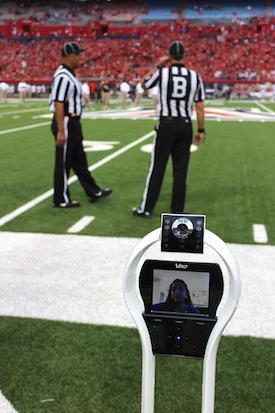by
Lauren Dubinsky, Senior Reporter | April 06, 2017

The teleconcussion robot on the sideline
of a Northern Arizona football game
The majority of public high schools don't have a full-time athletic trainer or neurologist on hand to spot concussions during games.
Fortunately, a new remote-controlled teleconcussion robot may be able to help fill the void.
The robot, developed by researchers from Mayo Clinic and the Peter O'Donnell Jr. Brain Institute, enables a neurologist to remotely evaluate athletes for concussions.



Ad Statistics
Times Displayed: 68628
Times Visited: 2236 Ampronix, a Top Master Distributor for Sony Medical, provides Sales, Service & Exchanges for Sony Surgical Displays, Printers, & More. Rely on Us for Expert Support Tailored to Your Needs. Email info@ampronix.com or Call 949-273-8000 for Premier Pricing.
In a study published in
Neurology, the research team stationed the robot on the sideline at football games and in the athletic training room for two seasons at Northern Arizona University.
The remote neurologists used diagnostic tools to measure cognition, and balance in 11 cases that were brought to the robot for review. Those assessments were compared with in-person diagnoses made by sideline medical personnel and were found to matched each time.
The researchers believe that this technology could be a "game-changer" in rural areas of the country where few physicians or athletic trainers are available to diagnose these injuries.
According to the Centers for Disease Control and Prevention, children under age 15 account for the majority of traumatic brain injury visits to the emergency room.
In addition, the National Federation of State High School Associations reported that up to 3.8 million recreational and athletic concussions occur in the U.S each year.
Previous research has investigated teleconcussion technology, but it was focused on diagnosing TBI in the military. This is the first research to measure how telemedicine can help diagnose concussions at sporting events.
The researchers are hoping the teleconcussion robot will be deployed for high school sports including soccer, basketball, baseball and cheerleading. They envision a scenario in which multiple districts could have one specialist on standby via the robot for their games.
"This is a way of bringing physicians into these outlying areas," Dr. Bert Vargas, the study's lead author, said in a statement. "One person could cover numerous schools. If you're on-call virtually, you could be anywhere and available as soon as a consult is needed."

